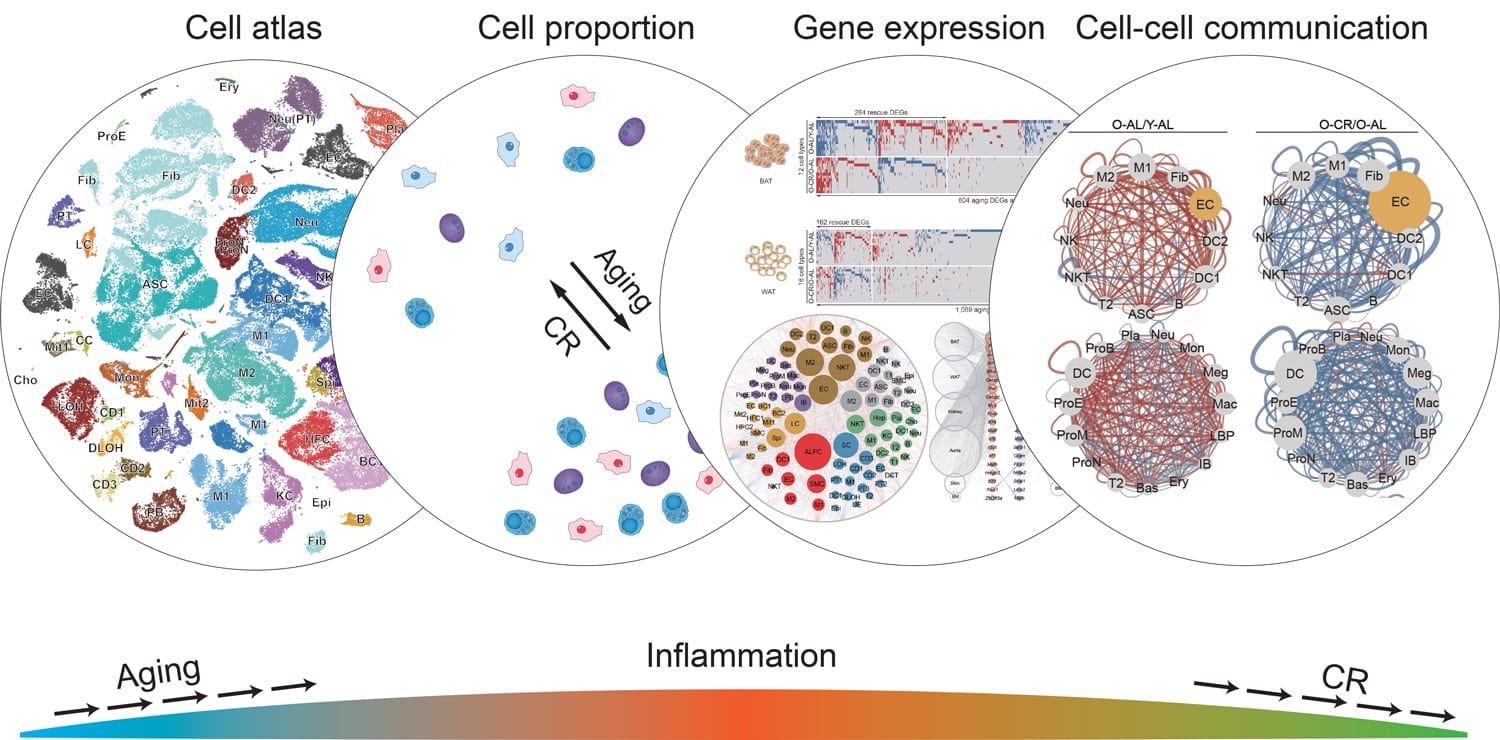
The illustration represents the ways in which caloric restriction affects various aspects of cellular function, with the overall result of reducing inflammation and the activity of many aging-related genes.
Credit: Salk Institute
If you want to reduce levels of inflammation throughout your body, delay the onset of age-related diseases and live longer—eat less food. That’s the conclusion of a new study by scientists from the US and China that provides the most detailed report to date of the cellular effects of a calorie-restricted diet in rats. While the benefits of caloric restriction have long been known, the new results show how this restriction can protect against aging in cellular pathways, as detailed in Cell on February 27, 2020.
“We already knew that calorie restriction increases life span, but now we’ve shown all the changes that occur at a single-cell level to cause that,” says Juan Carlos Izpisua Belmonte, co-corresponding author of the new paper, a professor in Salk’s Gene Expression Laboratory and holder of the Roger Guillemin Chair. “This gives us targets that we may eventually be able to act on with drugs to treat aging in humans.”
Aging is the highest risk factor for many human diseases, including cancer, dementia, diabetes and metabolic syndrome. Caloric restriction has been shown in animal models to be one of the most effective interventions against these age-related diseases. And although researchers know that individual cells undergo many changes as an organism ages, they have not known how caloric restriction might influence these changes.
In the new paper, Belmonte and his collaborators—including three alumni of his Salk lab who are now professors running their own research programs in China—compared rats who ate 30 percent fewer calories with rats on normal diets. The animals’ diets were controlled from age 18 months through 27 months. (In humans, this would be roughly equivalent to someone following a calorie-restricted diet from age 50 through 70.)
At both the start and the conclusion of the diet, Belmonte’s team isolated and analyzed a total of 168,703 cells from 40 cell types in the 56 rats. The cells came from fat tissues, liver, kidney, aorta, skin, bone marrow, brain and muscle. In each isolated cell, the researchers used single-cell genetic-sequencing technology to measure the activity levels of genes. They also looked at the overall composition of cell types within any given tissue. Then, they compared old and young mice on each diet.
Many of the changes that occurred as rats on the normal diet grew older didn’t occur in rats on a restricted diet; even in old age, many of the tissues and cells of animals on the diet closely resembled those of young rats. Overall, 57 percent of the age-related changes in cell composition seen in the tissues of rats on a normal diet were not present in the rats on the calorie restricted diet.
“This approach not only told us the effect of calorie restriction on these cell types, but also provided the most complete and detailed study of what happens at a single-cell level during aging,” says co-corresponding author Guang-Hui Liu, a professor at the Chinese Academy of Sciences.
Some of the cells and genes most affected by the diet related to immunity, inflammation and lipid metabolism. The number of immune cells in nearly every tissue studied dramatically increased as control rats aged but was not affected by age in rats with restricted calories. In brown adipose tissue—one type of fat tissue—a calorie-restricted diet reverted the expression levels of many anti-inflammatory genes to those seen in young animals.
“The primary discovery in the current study is that the increase in the inflammatory response during aging could be systematically repressed by caloric restriction” says co-corresponding author Jing Qu, also a professor at the Chinese Academy of Sciences.
When the researchers homed in on transcription factors—essentially master switches that can broadly alter the activity of many other genes—that were altered by caloric restriction, one stood out. Levels of the transcription factor Ybx1 were altered by the diet in 23 different cell types. The scientists believe Ybx1 may be an age-related transcription factor and are planning more research into its effects.
“People say that ‘you are what you eat,’ and we’re finding that to be true in lots of ways,” says Concepcion Rodriguez Esteban, another of the paper’s authors and a staff researcher at Salk. “The state of your cells as you age clearly depends on your interactions with your environment, which includes what and how much you eat.”
The team is now trying to utilize this information in an effort to discover aging drug targets and implement strategies towards increasing life and health span.
The Latest Updates from Bing News & Google News
Go deeper with Bing News on:
Caloric restriction
- Common Blood Pressure Drug Increases Lifespan And Slows Aging in Animals
The hypertension drug rilmenidine has been shown to slow down aging in worms, an effect that in humans could hypothetically help us live longer and keep us healthier in our latter years. Previous ...
- Does calorie restriction impact telomeres?
"There are many reasons why caloric restriction may extend human lifespans, and the topic is still being studied. One primary mechanism through which life is extended relates to m ...
- Could cutting down calories influence longevity?
A recent study looks at how caloric restriction could help slow down aging processes by reducing the shortening of telomeres, the 'protective caps' at the end of chromosomes.
- Could Eating Less Help You Live Longer?
Calorie restriction and intermittent fasting both increase longevity in animals, aging experts say. Here’s what that means for you.
- Why Don’t Crash Diets Work Long-Term?
Crash Diets Escalate Muscle Loss — Weight loss of any kind will invariably include both fat loss and muscle loss. However the extreme nature of a crash diet often leads to an escalated loss of ...
Go deeper with Google Headlines on:
Caloric restriction
[google_news title=”” keyword=”caloric restriction” num_posts=”5″ blurb_length=”0″ show_thumb=”left”]
Go deeper with Bing News on:
Calorie restriction
- Common Blood Pressure Drug Increases Lifespan And Slows Aging in Animals
The hypertension drug rilmenidine has been shown to slow down aging in worms, an effect that in humans could hypothetically help us live longer and keep us healthier in our latter years. Previous ...
- Does calorie restriction impact telomeres?
"There are many reasons why caloric restriction may extend human lifespans, and the topic is still being studied. One primary mechanism through which life is extended relates to m ...
- Could cutting down calories influence longevity?
A recent study looks at how caloric restriction could help slow down aging processes by reducing the shortening of telomeres, the 'protective caps' at the end of chromosomes.
- Six easy ways to lose an inch from your waist – in a week
The calorie maths tells us that for an average-sized person to lose an inch around the middle, it would require a 4lb weight-loss – the equivalent of around 14,000 calories, or the total weekly ...
- Could Eating Less Help You Live Longer?
Calorie restriction and intermittent fasting both increase longevity in animals, aging experts say. Here’s what that means for you.
Go deeper with Google Headlines on:
Calorie restriction
[google_news title=”” keyword=”calorie restriction” num_posts=”5″ blurb_length=”0″ show_thumb=”left”]










